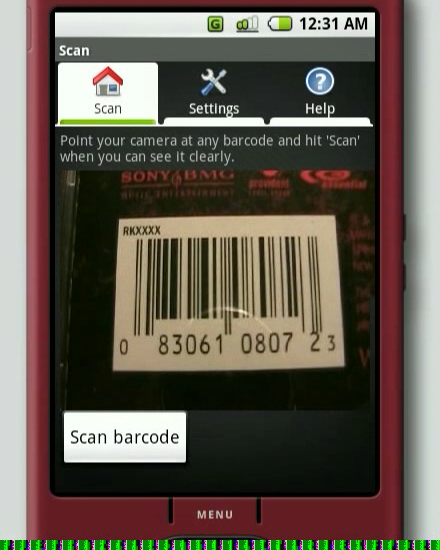Congrats to Jeffrey Sharkey and his Android Scan for being one of the Android Developer Challenge winners.
Scan is an Android application that finds pricing and metadata for anything with a barcode. Just point your phone at a barcode and scan it.
Here are some key features that make Scan stand out:
- Automatic barcode recognition using onboard phone camera using ZXing
- Shows CD, DVD, or book cover along with detailed reviews from Amazon.com
- Searches over a dozen stores, both online and brick+mortar
Highlights brick+mortar stores that are nearby, with option to call the store or get directions
- Links to online storefronts to buy online from the phone
- Tracklisting for CDs, along with option to play sample tracks right on phone
- For books, searches local libraries to see if they have a copy

For more info on Android Scan
9 comments:
Scott
Not trying to be a smartass but what is different about this from what Neomedia has been offering for several years now?
Larry
From what I can see, the phone doesn't require an auto-focus feature, the application is specifically designed for Google's OS, and it scans a 1d barcode.
Jeffrey Sharkey submitted his Android Scan mobile app in Google's Android Developer Challenge.
My guess is that because he submitted this barcode scanning application in their challenge and agreed to the terms of the contest, Google now "owns" the application.
If that is the case (I didn't read the terms of the Challenge), they got a pretty good deal for a few hundred thousand dollars.
Maybe NeoMedia can add Google to the list of companies they intend to sue on a patent that has never been proven in court.
I do not have auto focus on my Sony phone and the Neoreader reads the barcodes very quickly. I just think it is funny these guys would get this much recognition for something that has been around for so much time already.
I've got the feeling that barcode readers are already a dime a dozen...kind of like mobile marketing companies.
I agree.
Folks,
You can't have missed that Android Scan uses a MiniDV camera: "I ran into issues with cheap webcams not providing enough barcode detail, and instead had to use a firewire MiniDV camera as my video source." (http://scan.jsharkey.org/).
So, to summarize: here is a cool app which
- has been developed on an emulator (no Android handset available yet),
- uses an open source decoder known for its limitations in real-life cases (zxing from Google)
- benefits of huge visibility thanks to Google.
Basically, an app which takes shortcuts on the two key issues (the blur and the decoding algorithms) by using whatever was available. Well done.
More seriously, no camera phone today can provide the image quality this miniDV camera shows in the video.
Some high-end camera phones do have nice autofocus / macro modes but this is not going to reach the mainstream (mass) market any time soon because of BOM, and integration costs. The readers that have been developed for those high-end cameras often also use a trick, the "forced zooming": the zoom is set within the application so that the user has to move far away from the code to frame it. This provides for better focus as the distance to the object increases. However, it increases the impact of "motion blur" (that handshake when holding the phone) and reduces the resolution available for decoding, at least for the majority of phones which don't have an optical zoom. Net result? This setup is OK for rather large size bar codes but the decoding will fail very often in real-life cases. And the user experience is flaky at best.
All the above applies chiefly to 1D bar codes, however I have seen miserable failures when decoding 2D codes. It seems that a number of readers might be very sensitive to the light conditions.
So, if mobile bar code decoding (1D or 2D) is going to take off as a market, most camera phones must be able to decode those codes. Not just nice S60s or the like.
One way forward is to improve the platform, with camera phone vendors understanding that they need to provide better cameras (and I am not talking resolution here, but AF / macro / zoom combinations) in the entry- and mid-ranges. HOw long is it going to take? Can the BOM for those technologies be made compatible with mass-market camera phones? we've seen miracles at the sensor level, so why not? But how long is this going to take before it happens?
Congrats on the win however shame that Moseycode was passed over.
I guess the concept was a little more difficulat for the google judges to grasp.
Cheers,
Dean Collins
www.Cognation.net
This is one of the brilliant. post.I like your blog details.Try to present more this kind of information.
Android app developers
Your blog themes are really impressive and also good looking. i really enjoyed to saw your blog. so thanks for providing the good entertainment blog..
Post a Comment